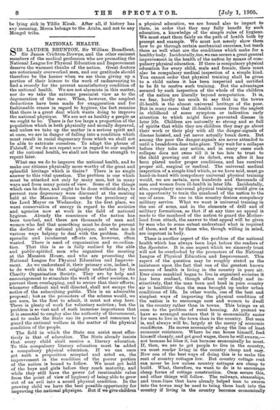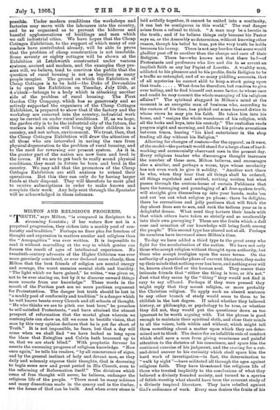NATIONAL HEALTH.
SM LAUDER BRUNTON, Sir William Broadbent, Sir James Crichton-Browne, and the other eminent members of the medical profession who are promoting the National League for Physical Education and Improvement deserve the warmest thanks of the nation. Great doctors are notoriously overworked men, and our gratitude should therefore be the keener when we see them giving up a portion of their leisure to the work of endeavouring to find a remedy for the present unsatisfactory condition of the national health. We are not alarmists in this matter, nor do we take the extreme pessimist view as to the degeneration of the race. When, however, the amplest deductions have been made for exaggeration and for fashionable crazes in regard to hygiene, the fact remains that there is a great deal which wants doing to improve the national physique. We are not as healthy a people as we ought to be. There is far too large a proportion of the population which is both physically and morally depraved, and unless we take up the matter in a serious spirit and at once, we are in danger of falling into a condition which must result in racial degeneracy from which we shall not be able to extricate ourselves. To adapt the phrase of Falstaff, if we do not repent now in regard to our neglect of the national health, we shall not have the strength to repent later.
What can we do to improve the national health, and to make our citizens physically more worthy of the great and splendid heritage which is theirs ? There is no single answer to this vital question. The problem is one which must be attacked not only by many men, but in many ways and from many points of view. Some of the things which can be done, and ought to be done without delay, to prevent race degeneracy were discussed at the meeting held at the Mansion House under the presidency of the Lord Mayor on Wednesday. In the first place, we want conservation of energy in regard to the societies and. agencies now at work in the field of national hygiene. Already the conscience of the nation has been touched, and there are thousands of men and women who feel that something must be done to prevent the decline of the national physique, and who are in various ways helping to deal with the problem. Such sporadic and incoherent efforts are, however, often wasted. There is need of organisation and co-ordina- tion. That this is so is fully realised by the able and, public-spirited men who organised the meeting at the Mansion House, and who are promoting the National League for Physical Education and Improve- ment. As we understand it, their primary aim, indeed, is to do work akin to that originally undertaken by the Charity Organisation Society. They are by help and encouragement to stimulate the work of other societies, to prevent them overlapping, and to secure that their efforts, whenever efficient and well directed, shall not escape the notice of the subscribing publics. This is an admirable proposal ; but as the promoters of the scheme would, we are sure, be the first to admit, it must not stop here. There is plenty of work for voluntary societies ; but the problem is so vast and of such immense importance that it is essential to employ also the authority of Government, and to make the State use its powers and resources to guard the national welfare in the matter of the physical condition of the people.
The field in which the State can assist most effec- tively is that of education. The State already insists that every child shall receive a literary education. To this compulsory literary education must be added a compulsory physical education. If we can once get such a proposition accepted and acted on, the improvement in the condition of the poorer portion of the nation is bound to follow. We must get hold of the boys and girls before they reach maturity, and while they still have the power (of inestimable value from the point of view of hygiene) of being able to grow out of an evil into a somid physical condition. In the growing child we have the best possible opportunity for improving the national physique. ilut if we give children a physical education, we are bound also to impart to them, in order that they may fully benefit by such education, a knowledge of the simple rules of hygiene. We must start them fairly on the path of health both by precept and example. We must not merely show them how to go through certain mechanical exercises, but teach them as well what are the conditions which make for a healthy body. Incidentally,too, we can secure a great general improvement in the health of the nation by means of com- pulsory physical education. If there is compulsory physical education for every child, male and female, there must also be compulsory medical inspection of a simple kind. You cannot order that physical training shall be given to a child unless it has been inspected and certified to be fit to receive such training. But the advantages secured by such inspection of the whole of the children of the nation are literally beyond computation. It is, we fear, hardly too much to say that in the towns ill-health is the almost universal heritage of the poor. But in many cases that ill-health comes from the neglect in childhood of some symptom or indication early attention to which might have prevented disease in later life. Children are natuivilly so strong and so full of spirits that while they are children they may go about their work or their play with all the danger-signals of disease hoisted., and yet never actually break down. But among the poor the danger-signals are never attended to until a breakdown does take,place. They wait for a collapse before they take any action, and in many cases such collapse does not come till it is too late to trust to the child growing out of its defect, even after it has been placed under proper conditions, and has received. proper aid, surgical or medical. The universal medical inspection of a simple kind which, as we have said, must go hand-in-band with compulsory universal physical training would, we are certain, save hundreds and thousands of men and women from ill-health in later life. Incidentally, also, compulsory universal physical training would give us an opportunity to train the manhood. of the nation to the use of arms. No one in this country desires compulsory military service. What we want is universal training in the use of arms, and in the elements of drill and of military formations, so that if at any time an appeal is made to the manhood of the nation to guard the Mother- land from attack, the answer to that appeal will be given by men who to some extent understand. what is required. of them, and not by those who, though willing in mind, are impotent in body. There is another aspect of the problem a the national health which has always been kept before the readers of the Spectator. It is. one aspect which we sincerely trust will not be overlooked. by the promoters of the National League of Physical Education and. Improvement. This aspect of the question may be roughly stated as the insistence upon .the fact that one of the greatest known sources of health is living in the country in pure air. Ever since mankind. began to live in organised societies it has been realised, though often only dimly and in- stinctively, that the man born and bred in pure country air is healthier than the man brought up under, urban conditions of life. In other words, one of the best and simplest ways of improving the physical condition of the nation is to encourage men and women to dwell in the country rather than in towns. This brings us at once to the problem of rural housing. At present we have so arranged matters that it is economically easier for men to live in the town than in the country. But man is, and. always will be, largely at the mercy of economic conditions. He moves necessarily along the line of least economic resistance. Where he can house himself, feed himself cheaply, and get good wages, there he will swarm,— not because he likes it, but because economically he must. If, then, we are to get people to live in the country, we must render living in the country cheap and easy. Now one of the best ways of doing this is to make the rent of country cottages low. But country cottage rent can never be low unless country cottages are cheap to build. What, therefore, we want to do is to encourage cheap forms of cottage construction. One secure this, and other things will follow. The railwayb, steamships, and tram-lines that have already helped men to swarm into the towns may be used to bring them back into the country if living in the country becomes economically possible. Under modern conditions the workshops and factories may move with the labourers into the country, and be so organised as to prevent the hideous and baneful agglomerations of buildings and men which we call industrial cities. We have hopes that the Cheap Cottages Exhibition, to the support of which many of our readers have contributed already, will be able to prove that the problem of cheap construction is not insoluble. Some seventy or eighty cottages will be shown at the Exhibition at Letchworth constructed under various systems, ancient and modern, and the examples they pre- sent will, we believe, tend to convince the public that the question of rural housing is not as hopeless as many people imagine. The ground on which the Exhibition of Cheap Cottages is to be held—the Duke of Devonshire is to open the Exhibition on Tuesday, July 25th, at 4 o'clock—belongs to a body which is attacking another side of the problem of rural housing. The First Garden City Company, which has so generously and so actively supported the organisers of the Cheap Cottages Exhibition, is prepared to show that if the factory and the workshop are removed into the country, industrial work may be carried on under rural conditions. If, as we hope, the garden city is to be the industrial city of the future, the workers in such cities will bring up their children in a country, and not urban, environment. We trust, then, that the Cheap Cottages Exhibition will draw the attention of all those who are interested in 'saving the race from physical degeneration to the problem of rural housing, and to the need for reversing our present system. Al it is, the greater part of the nation are now born and bred in the towns. If we are to get back to really sound physical conditions, they must in f aim be born and bred in the country. We may add that the promoters of the Cheap Cottages Exhibition arc still anxious to extend their operations. But this they can only do by having larger funds at their disposal. They will therefore be molt glad to receive, subscriptions in order to make known and complete their work. Any help sent through the Spectator will be acknowledged in these columns.











































 Previous page
Previous page